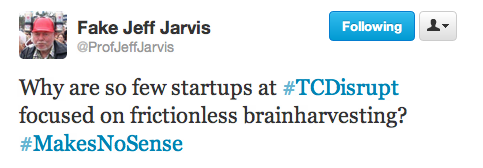
cc licensed ( BY NC ND ) flickr photo shared by NASA’s Marshall Space Flight Center
I was a minor player in an episode that is known, in my mind at least, as The Great Attribution Hubbub. Short version: via trackbacks and alerts from friends, some bloggers who tilt to the open side of the spectrum found that their posts had been aggregated with inadequate, unclear or non-existent attribution by an educational consultant. Said consultant’s bio trumpeted that he was a big corporate player, and a founder of Blackboard.
A few of the people who had their work aggregated responded with shock and vitriol, among them Alan Levine and Clark Quinn. Personally, I was nowhere near as upset. Though I don’t want to diminish how others felt… and the comments to both Alan’s post and Clark’s post unearth some other details and allegations that to me are more troubling.
I wasn’t upset because when I decided to apply the CC-BY license to this blog, I did so mindful that my work could be appropriated for commercial uses I might not be comfortable with… I figured if something I posted here could be used in those ways, then I was obviously doing something wrong. So I got a wake-up call. If I want to maintain this space as a cozy lovenest of ed tech subversion, I need to do better.
But the episode does reflect a few more significant lessons. One, that the CC-BY license, especially as practiced by most casual users (who rarely define how they wish to be attributed, etc…) does not protect against some uses that can feel like abuses. As I pointed out to Alan, since he embedded his attribution into his own RSS feed, legally speaking Gilfus did not violate the terms of his CC-BY license. Alan subsequently added SA (and some other choice words) to his license, and for similar reasons Clark uses SA and NC in his own terms. The ideological purity arguments aside, there are legitimate reasons that people might want to share, yet feel uncomfortable with what may come of it. That’s why the SA and NC clauses exist, however ill-defined they may be.
Which brings me to a comment on Alan’s blog left by Martha Rans of Artists Legal Outreach. Martha argues that for artists a real attribution process involves some communication, and as a result “artists are sceptical of adopting Creative Commons licenses because they do not actually want it to be easy for you to avoid the direct contact with them they want.”
Which reminds me why I often send an email to people whose work I am reusing under CC, even though legally I may not be required to do so. It lessens the likelihood of ill will being generated, and a good relationship is usually worth more to me than a media asset. Frequently, the act of communicating opens up new possibilities, access to other resources, and useful dialogue.
Which sends me back to a talk that David Wiley gave at UBC back in 2007 (I see I need to update those dead audio links). This talk has been immensely influential on my thinking. One of the key concepts David articulated was the need for “frictionless adaptability” around IP. Here’s that segment, lovingly laid over a loop sampled from what may be the greatest single of the 1970’s, “Brandy” by Looking Glass: [audio:https://abject.ca/wp-content/uploads/2012/09/WileyBrandyOpenness.mp3]
I’m starting to rethink friction when it comes to sharing. Certainly, most examples of frictionless sharing that I see on the web just add to online noise: autotweets, zombie curation (such as the “news feed” that prompted The Great Attribution Hubbub, at one point reproducing a post complaining about the misuse), pointless notifications, redundancy. Do I need to know via Twitter that you favorited a video on YouTube? A Facebook notification that you are listening to music on Spotify? If that piece of media you just liked is worth sharing with hundreds or thousands of people in your networks, shouldn’t it be worth typing 140 characters or less to tell us why?
So many chunks of the Vapid Web that is choking the life out of my browser are fed by the frictionless web, or services that make it easy to spew an instant opinion or rating with no contextual grounding whatsoever. Restaurant and hotel ratings online are rarely useful, the “help” you will find on random ad-supported unmoderated discussion boards is usually divorced from any real utility. It makes me wonder how much real meaning and other things we value on the web are actually supported by the right kinds of friction.
I certainly don’t want to valourize pointless difficulty: bad interfaces, fear-driven rules, or the kinds of bureaucratic processes that Wiley correctly argues just get in the way of most educational sharing (lawyers, contracts, cheques, etc…).
But could the articulation of processes for meaningful friction, forms of friction that actually promote discourse, reflection, and deeper understanding be worthwhile? Could that be a mission worth taking on by educators?

I just caused some @brlamb friction. You should try it. You’ll like it. http://t.co/ocSnS0Sh
I hope it is not too wrong of me to point out that in my talk to ACCESS2011 I said: “We need [. . .] to return to an ethic of
difficulty in all its various meanings.” There was further discussion of this in the Q&A.
Jon, link away to that talk any time you want… it is so good. I urge anyone who hasn’t seen it to give it a look.
There’s an analogous argument re: the global financial crisis. If it hadn’t been so easy to move money around, perhaps the Europeans wouldn’t be in this mess.
A little friction can be a good thing | Abject http://t.co/PG8z6BQF “rethink friction when it comes to sharing” via @brlamb
I’ve been coming back to this post, because it’s resonating. Friction isn’t a bad thing. (it’s also a metaphor – there’s no actual “friction” online – but that’s another issue).
Without any friction, things become so easy as to be taken for granted. Then, we build up a sense of entitlement to those things (objects, services, etc…). It’s not just online. Look at even something as ubiquitous as the car. It made traveling frictionless. Hop in, and you can now travel 100km without having to think about it. And so we design our lives around that entitlement. I can work 50km from where I work. I can shop 50km from there. And the lack of friction just builds on top of the previous entitlement. Suddenly, I demand 10 lane freeways to protect my 50km shopping trip, and to keep my 50km commute to less than half an hour. Etc…
Or, there was a time when a trip to Europe involved a week-long journey by ship, before even getting there. And another week-long trip to get home. There was friction. It was a Big Deal. And now, it’s a common thing to hop on a plane, bitch about how it took an extra 5 minutes in security, and how I had to turn off my laptop for 10 minutes. No friction. Entitlement. Etc…
Annnnnnyway. Friction.
D’Arcy – one of my favorite things about blogging are those times when a response reveals something new to me about something I’ve written. Your extension of the riff on friction opens up a deeper and more compelling take on the subject than I saw before… Thanks so much for letting the idea percolate, and for coming back with this.
I hope this takes me somewhere else.
Tangents. I’m all about the tangents…